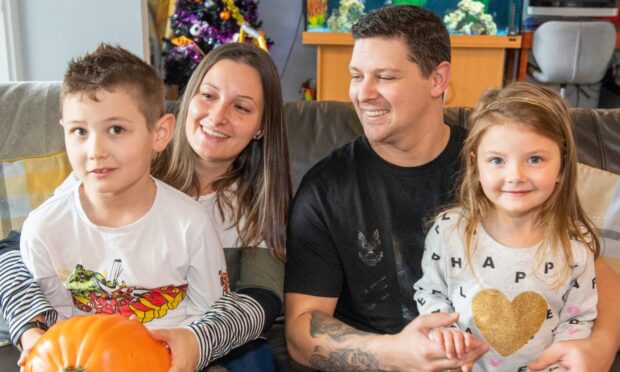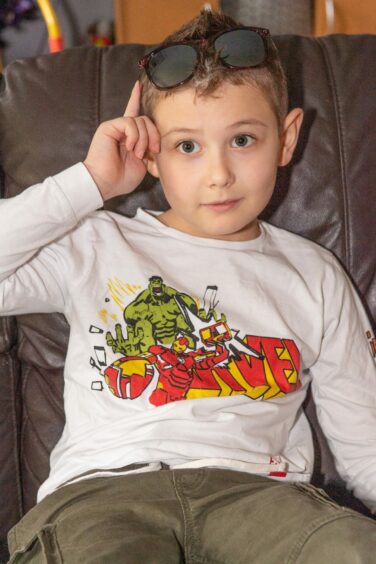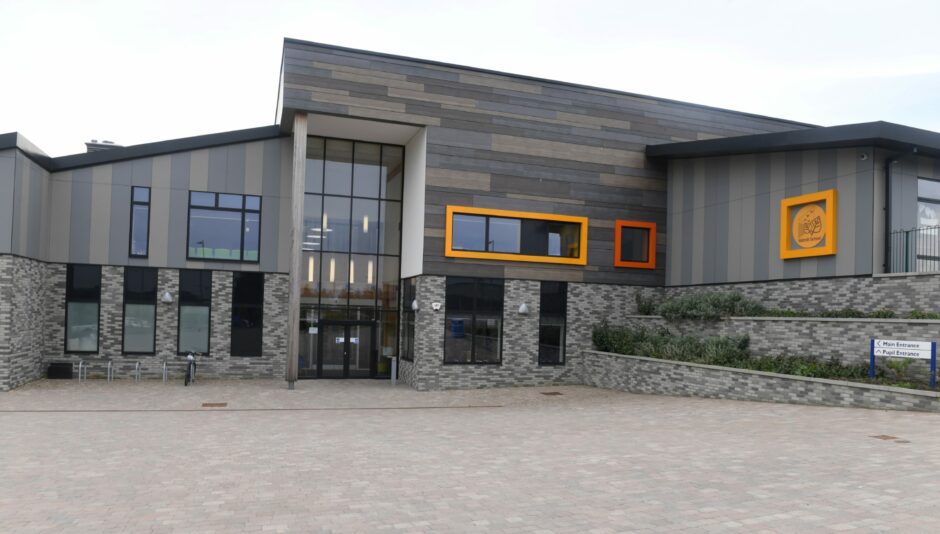Jade and Neil Ritchie say they fear for their son’s safety, as he continues to try to run away from school.
Tyler, who turns nine this week, was diagnosed autistic shortly before starting primary school. Since then, his parents say they’ve faced a constant battle to get autism support.
They fear their son is missing out on his education, and needs more help to reach his full potential. Even more worrying, Tyler’s frustration often boils over into verbal aggression and danger-seeking.
It’s left his family feeling despondent about the system that’s meant to support autistic kids.
Tyler’s granny reached out to the P&J after reading our autism series. The family say they want to help shine a light on the reality for children like Tyler.
“I want other parents to know what help is available,” says Jade. “When Tyler was diagnosed I left in tears, with no idea what to do.”
‘No sense of danger’
For Tyler, living with autism can at times feel overwhelming. Jade recalls a birthday party where he battled to cope with his additional support needs.
“At first he was very nervous and didn’t want to go,” she says. “First his ADHD kicked in and he went very hyper, then his autism kicked in and he had a meltdown. He couldn’t figure out his emotions and he just exploded. But he does calm down and say sorry.”
At school, this can lead to some worrying behaviour. Tyler will sometimes clench his fists and verbally lash out at his teachers. Other times, he simply tries to run away.
“He’s a flight risk and has no sense of danger,” says Jade. “If he sees something that interests him he won’t bat an eyelid, he’ll just leave.”
Tyler originally attended Alehousewells Primary in Kemnay, but his parents felt that the school couldn’t support his autism. Aberdeenshire Council agreed to transfer Tyler to Kintore Primary School following an assessment by educational psychologists.
However, while Neil and Jade say Tyler’s teachers are brilliant, his care needs continue to escalate.
“Kintore is fantastic but the building is open to the public,” says Neil. “There are no fences around it and it’s close to a main road, so we feel there’s still a safety risk.”
Climbing out the window
The family are talking from experience. One day, Jade walked into her upstairs living room to find Tyler had pushed the window open past the safety latch and attempted to climb out. Luckily, his t-shirt was caught on the handle, which is all that prevented him from falling.
On another occasion, he pushed out a slat in their garden fence and ran down the road. His childminder had gone inside for just 10 minutes, but it was all the time he needed to make his escape.
A couple of girls found Tyler on the street, thankfully unharmed. The family contacted the council to ask permission to put up a higher garden fence. This too was a battle. They say it took four attempts to get locks added to the windows, and they were only allowed to increase the height of the fence to 1.35 metres.
As Tyler grows physically taller and stronger, keeping him safe will become increasingly challenging.
The family is already thinking ahead to Tyler joining Kemnay Academy, and what autism support might be available.
“They won’t know what’s hit them,” worries Neil.
‘They’re very reluctant to tell you what autism support there is’
Both Neil and Jade emphasise that Tyler’s teachers have been “absolutely brilliant” with him, and they’re grateful for the support of other parents too.
However, their issue is with the system itself. Every step of their autism journey has brought unique challenges, for which they’ve found very little support.
“We didn’t know he was autistic initially,” says Jade. “He was non-verbal, but we kept getting told ‘he’s a boy, he’ll catch up’. Then when he went to nursery we saw a big difference. He wasn’t at the same level as everybody else, but again we were told not to worry, everything will be fine.”
Before long, a nursery teacher noticed that Tyler didn’t make eye contact or respond to his name. His childminder also flagged up that he could be autistic. This prompted a trip to the GP but it took a year to get a formal diagnosis.
“He was passed from the child development team, paediatricians, health visitors, doctors – no one wanted to make the diagnosis,” says Jade. “They kept telling us they don’t want to just label him, which is fine. But it did take a long time.”
Tyler was finally diagnosed shortly before he turned five. By this time he was still non-verbal and the family felt lost. Jade recalls walking out in tears, with no idea what to do next.
“It feels like they’re very reluctant to tell you what autism support there is,” she says. They say ‘there’s your diagnosis’ and we say ‘what happens now?’ but it’s just – nothing.”
‘It feels like I’m finding my way through the dark’
Today, Tyler has started to speak, but he still struggles to communicate clearly.
Ironically, Jade says his speech and language consultant won’t see him because he is no longer non-verbal. He’s due to see a paediatrician next month, for the first time in years. Jade has learned Makaton and undertaken mental health training but the family had to fund it themselves.
“I feel like I’m finding my way through the dark,” says Jade. “I don’t know what support there is to help us through it. Some days can be really difficult. Neil works offshore so it’s hard for him being away from us all.”
They lovingly describe five-year-old daughter Millie as a “diva”, saying she sometimes struggles to understand why Tyler needs the extra attention.
“She does play on it sometimes to see how much she can get away with,” says Jade.
It’s a lot of pressure for the young family. They worry that a lack of funding for autism support staff means Tyler will struggle to progress academically. Now in primary five, he’s academically at primary one level.
Jade’s mother recently picked Tyler up from school and found him playing Lego in the corridor.
“If they manage to get tasks out of him – his ‘jobs’ as he calls it – he’s allowed to play for the rest of the day,” says Jade.
“I have spoken to the school about it because he’s going to Academy in two years and I’ve asked them to push him a little further. But as they’ve said, they can’t push him too much or it could have the opposite effect. We’re trying to find the happy medium.”
More staff needed to support children with autism
Neil believes the number of children with additional support needs at Kintore has doubled in recent years but the funding has not increased with it. He worries there’s not enough staff to help children reach their full potential.
“It always loops back to not having the funding, which just isn’t true,” says Neil. “This is a decision they’ve made to not fund autism support.”
Aberdeenshire Council responds
A spokesman for Aberdeenshire Council said it was fully committed to meeting the needs of every child and young person in Aberdeenshire.
“Around 43% of our school population is recorded as receiving help with additional support needs, and that help is shaped around their unique needs and circumstances.
“Funding and resourcing around this remains consistent with previous years.”
He said the council works with schools, parents and partners to ensure children’s needs are met, in line with the principles of Getting It Right For Every Child (GIRFEC).
“Any parent who has concerns is encouraged to discuss this with their child’s school in the first instance,” he added.
Like all parents, Jade and Neil simply want the best for their child. In Tyler’s case, that has to start with the very basics.
“We want him to be safe and to get the support he needs,” says Jade. “Instead, it’s a constant fight. We were completely blind. Everything I know about autism now I’ve learned through internet searches and from other parents.
“It would be nice if you got the diagnosis and they said ‘We’re here for you’.”
More from the Schools & Family team
School strikes back on? Unions renew threats to disrupt services
Double celebration for UHI as graduates scoop prestigious prizes
Seasonal Affective Disorder: How to care for others, when you’re struggling to care for yourself





Conversation